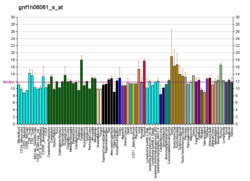STK36
Serine/threonine-protein kinase 36 is an enzyme that in humans is encoded by the STK36 gene.[5][6]
Interactions
STK36 has been shown to interact with GLI1.[5]
References
- 1 2 3 GRCh38: Ensembl release 89: ENSG00000163482 - Ensembl, May 2017
- 1 2 3 GRCm38: Ensembl release 89: ENSMUSG00000033276 - Ensembl, May 2017
- ↑ "Human PubMed Reference:".
- ↑ "Mouse PubMed Reference:".
- 1 2 Murone M, Luoh SM, Stone D, Li W, Gurney A, Armanini M, Grey C, Rosenthal A, de Sauvage FJ (Aug 2000). "Gli regulation by the opposing activities of fused and suppressor of fused". Nat Cell Biol. 2 (5): 310–2. PMID 10806483. doi:10.1038/35010610.
- ↑ "Entrez Gene: STK36 serine/threonine kinase 36, fused homolog (Drosophila)".
Further reading
- Ewing RM, Chu P, Elisma F, et al. (2007). "Large-scale mapping of human protein-protein interactions by mass spectrometry.". Mol. Syst. Biol. 3 (1): 89. PMC 1847948
 . PMID 17353931. doi:10.1038/msb4100134.
. PMID 17353931. doi:10.1038/msb4100134. - Gerhard DS, Wagner L, Feingold EA, et al. (2004). "The status, quality, and expansion of the NIH full-length cDNA project: the Mammalian Gene Collection (MGC).". Genome Res. 14 (10B): 2121–7. PMC 528928
 . PMID 15489334. doi:10.1101/gr.2596504.
. PMID 15489334. doi:10.1101/gr.2596504. - Østerlund T, Everman DB, Betz RC, et al. (2005). "The FU gene and its possible protein isoforms.". BMC Genomics. 5 (1): 49. PMC 512281
 . PMID 15268766. doi:10.1186/1471-2164-5-49.
. PMID 15268766. doi:10.1186/1471-2164-5-49. - Ota T, Suzuki Y, Nishikawa T, et al. (2004). "Complete sequencing and characterization of 21,243 full-length human cDNAs.". Nat. Genet. 36 (1): 40–5. PMID 14702039. doi:10.1038/ng1285.
- Strausberg RL, Feingold EA, Grouse LH, et al. (2003). "Generation and initial analysis of more than 15,000 full-length human and mouse cDNA sequences.". Proc. Natl. Acad. Sci. U.S.A. 99 (26): 16899–903. PMC 139241
 . PMID 12477932. doi:10.1073/pnas.242603899.
. PMID 12477932. doi:10.1073/pnas.242603899. - Nakayama M, Kikuno R, Ohara O (2003). "Protein-protein interactions between large proteins: two-hybrid screening using a functionally classified library composed of long cDNAs.". Genome Res. 12 (11): 1773–84. PMC 187542
 . PMID 12421765. doi:10.1101/gr.406902.
. PMID 12421765. doi:10.1101/gr.406902. - Nagase T, Ishikawa K, Kikuno R, et al. (2000). "Prediction of the coding sequences of unidentified human genes. XV. The complete sequences of 100 new cDNA clones from brain which code for large proteins in vitro.". DNA Res. 6 (5): 337–45. PMID 10574462. doi:10.1093/dnares/6.5.337.
- Gold MO, Yang X, Herrmann CH, Rice AP (1998). "PITALRE, the catalytic subunit of TAK, is required for human immunodeficiency virus Tat transactivation in vivo.". J. Virol. 72 (5): 4448–53. PMC 109679
 . PMID 9557739.
. PMID 9557739.
This article is issued from
Wikipedia.
The text is licensed under Creative Commons - Attribution - Sharealike.
Additional terms may apply for the media files.





